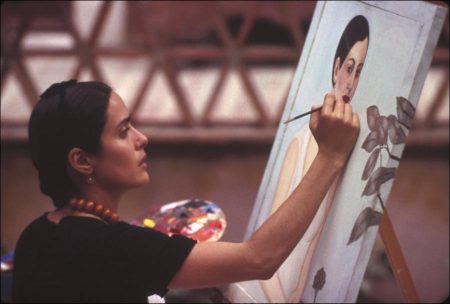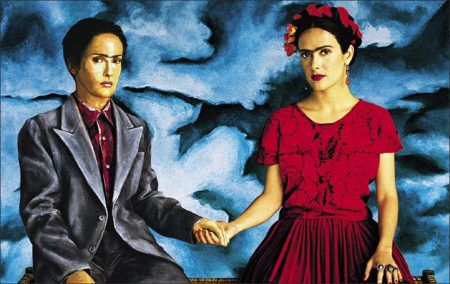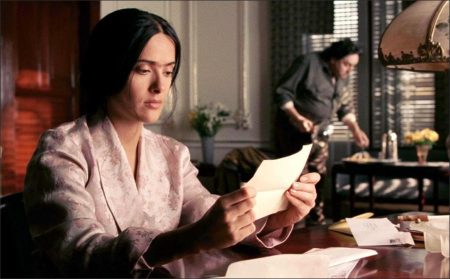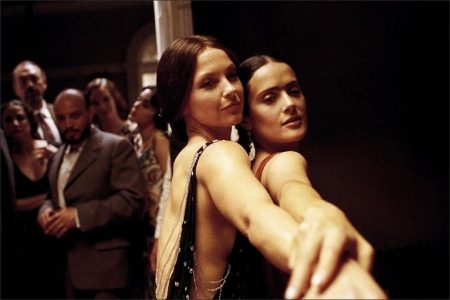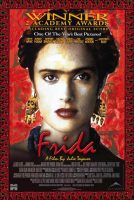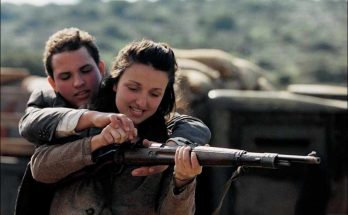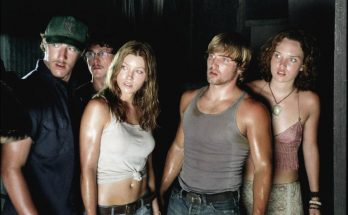Taglines: Prepare to be seduced.
Frida chronicles the life Frida Kahlo shared unflinchingly and openly with Diego Rivera, as the young couple took the art world by storm. From her complex and enduring relationship with her mentor and husband to her illicit and controversial affair with Leon Trotsky, to her provocative and romantic entanglements with women, Frida Kahlo lived a bold and uncompromising life as a political, artistic, and sexual revolutionary.
Frida is a 2002 American biopic drama film directed by Julie Taymor. It depicts the professional and private life of the surrealist Mexican painter Frida Kahlo. It stars Salma Hayek in her Academy Award-nominated portrayal as Kahlo and Alfred Molina as her husband, Diego Rivera. The movie was adapted by Clancy Sigal, Diane Lake, Gregory Nava and Anna Thomas from the book Frida: A Biography of Frida Kahlo by Hayden Herrera. Frida received moderately positive reviews from critics, and won two Academy Awards for Best Makeup and Best Original Score.
On August 29, 2002, the film made its world premiere opening the Venice International Film Festival. Frida’s American premiere was at the Los Angeles County Museum of Art in Los Angeles on October 14 of that year. It had its Mexican premiere on November 8, 2002 at Mexico City’s Palace of Fine Arts.
Frida was initially shown in five theaters and earned $205,996 upon its opening weekend in the United States. The following week the film expanded to forty-seven theaters, earning $1,323,935. By late December 2002, Frida was playing in 283 theaters and had earned over $20 million. The film earned $56,298,474 in its worldwide total gross.
uh4>About the Story
The film version of Frida Kahlo’s life was initially championed by Nancy Hardin, a former book editor and Hollywood-based literary agent, turned early “female studio executive”, who, in the mid-1980s wished to “make the transition to independent producing.” Learning of Hayden Herrara’s biography of Kahlo, Hardin saw Kahlo’s life as very contemporary, her “story… an emblematic tale for women torn between marriage and career.” Optioning the book in 1988, Hardin “tried to sell it as an epic love story in the tradition of Out of Africa, attracting tentative interest from actresses such as Meryl Streep and Jessica Lange, but receiving rejection from the film studios.
As Kahlo’s art gained prominence, however “in May, 1990 one of Kahlo’s self-portraits sold at Sotheby’s for $1.5 million, the highest price ever paid at auction for a Latin American painting.” Madonna “announced her plans to star in a film based on Frida’s life”, and Robert De Niro’s Tribeca Productions reportedly “envisioned a joint biography of Rivera and Kahlo.”
In the spring of 1991, director Luis Valdez began production on a New Line feature about Frida Kahlo starring Laura San Giacomo in the lead. San Giacomo’s casting received objections due to her non-Hispanic ethnicity, and New Line complied with the protesters’ demands, and left the then-titled Frida and Diego in August, 1992 citing finances. Hardin’s project found itself swamped by similar ones:
“When I first tried to sell the project … there was no interest because nobody had heard of Frida. A few years later, I heard the exact opposite – that there were too many Frida projects in development, and nobody wanted mine.”
Valdez was contacted early on by the – then unknown in the U.S. – Salma Hayek, who sent “her [promo] reel to the director and phoned his office”, but was ultimately told she was then too young for the role. By 1993, Valdez had retitled the film The Two Fridas with San Giacomo and Ofelia Medina both playing the portraitist. Raúl Juliá was cast as Diego Rivera, but his death further delayed the movie. At the same time, Hardin approached HBO, and with “rising young development executive and producer”
Lizz Speed (a former assistant to Sherry Lansing) intended to make a television movie, hopeful that Brian Gibson (director of “What’s Love Got to Do With It, the story of Tina Turner” and The Josephine Baker Story) would direct. Casting difficulties proved insurmountable, but Speed joined Hardin in advocating the project, and after four years in development, the two took the project from HBO to Trimark and producer Jay Polstein (with assistant Darlene Caamaño). At Trimark, Salma Hayek became interested in the role, having “been fascinated by Kahlo’s work from the time she was 13 or 14” – although not immediately a fan.
Hayek was so determined to play the role that she sought out Dolores Olmedo Patino, longtime-lover of Diego Rivera, and (after his death) administrator to the rights of Frida and Rivera’s art, which Rivera had “willed … to the Mexican people”, bequeath[ing] the trust to Olmedo.
Salma Hayek personally secured access to Kahlo’s paintings from her, and began to assemble a supporting cast, approaching Alfred Molina for the role of Rivera in 1998. According to Molina, “She turned up backstage [of the Broadway play ‘Art’] rather sheepishly, and asked if I would like to play Diego”. Molina went on to gain 35 pounds to play Rivera. When producer Polstein left Trimark, however, the production faltered again, and Hayek approached Harvey Weinstein and Miramax, and the company purchased the film from Trimark; Julie Taymor came onto the project as Director.
Meanwhile, in August 2000 it was announced that Jennifer Lopez would star in Valdez’s take on the story, The Two Fridas, by then being produced by American Zoetrope. Nonetheless, it was Hayek and Miramax who began production in Spring, 2001 on what was to become simply titled Frida.
Frida (2002)
Directed by: Julie Taymor
Starring: Salma Hayek, Mia Maestro, Amelia Zapata, Alejandro Usigli, Diego Luna, Alfred Molina, Antonio Banderas, Valeria Golino, Saffron Burrows, Ashley Judd
Screenplay by: Clancy Sigal
Production Design by: Felipe Fernández del Paso
Cinematography by: Rodrigo Prieto
Film Editing by: Françoise Bonnot
Set Decoration by: Hannia Robledo
Art Direction by: Bernardo Trujillo
Mekeup Department: Judy Chin, Beatrice De Alba, Sylvia Fernández
Music by: Elliot Goldenthal
MPAA Rating: R for sexuality / nudity and language.
Distributed by: Miramax Films
Release Date: August 29, 2002
Views: 174
